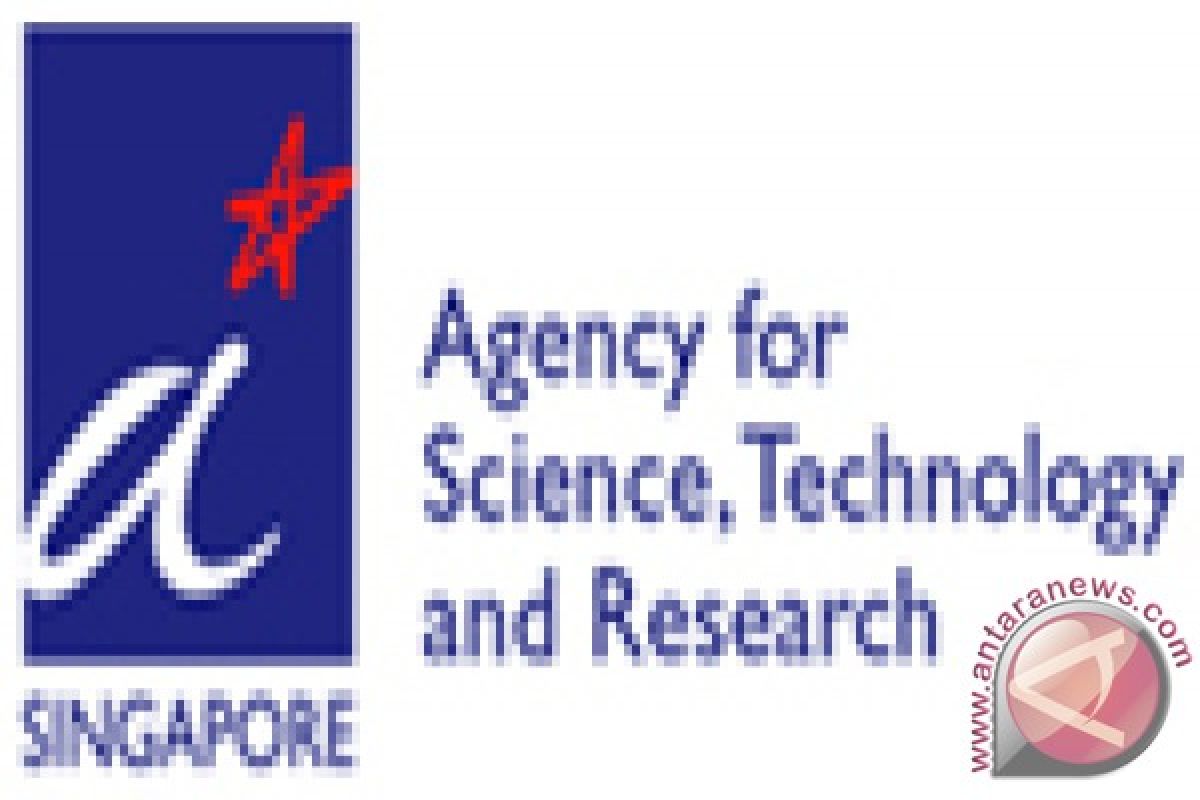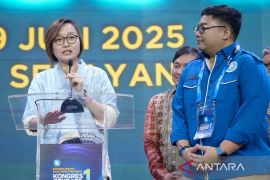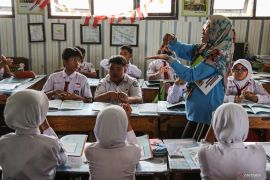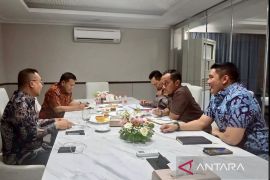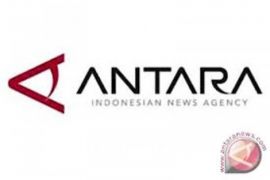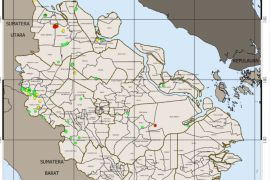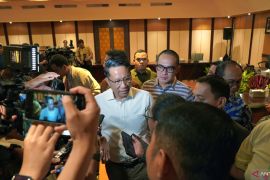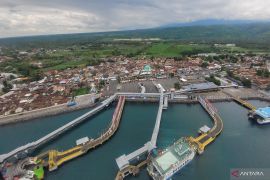- Singapore's biomedical sciences strategy achieves Economic, Scientific and Healthcare Impact
Jakarta, Oct 16, 2013 - (ANTARA) - Singapore's Biopolis celebrates its 10th anniversary this year. Within a decade, Biopolis has established a reputation as a world-class biomedical research hub and put Singapore on the scientific world map. The Biomedical Sciences (BMS) industry has also generated economic wealth for Singapore, created jobs and improved human health and the quality of life.
Opened in 2003, Biopolis anchors the development of the entire chain of BMS activities - from research and development (R&D) to manufacturing and healthcare. Biopolis also plays a pivotal role in bringing together major research institutes to create a centre of excellence in BMS and serves as a focal point to attract and groom top scientific talent to do world-class research in Singapore.
Mr Lim Chuan Poh, Chairman of A*STAR and Co-Chair, Biomedical Sciences Executive Committee (BMS EXCO) said, "Biopolis was conceived as part of a bold vision to establish the BMS as a key pillar of Singapore's economy. That vision has become a reality. Today, Biopolis is a thriving eco-system of public research institutions and corporate labs and a vibrant community of local and international biomedical scientists carrying out world-class R&D."
While Biopolis initially focused on supporting the pharmaceuticals and biologics industry, it is now diversifying to leverage new areas which are fast-growing in the Asia Pacific such as medical technology (MedTech), personal care, and food and nutrition. Many of its research programmes are also well integrated with the clinical and academic research communities, a good example of which would be stratified medicine. To this end, A*STAR has launched strategic research thrusts to address these areas. (See Annex A for information on strategic research thrusts).
Singapore has come a long way in its BMS journey over the last decade, making important economic, scientific and healthcare contributions to the country, even as the base of basic, translational and clinical research capabilities was being built.
The BMS industry has rapidly grown to become the fourth pillar of the economy. Since 2000, BMS manufacturing output has increased by nearly five-fold from $6 billion in 2000 to $29.4 billion in 2012. Employment in the BMS manufacturing industry grew 2.5 times, from 6,000 to 15,700 in the same period. In 2012, the Value-Add (VA) of the BMS industry rose to $15.3 billion, contributing 25.5% of total manufacturing VA. BMS is now the largest VA contributor to the manufacturing sector in Singapore.
Biomedical research in Singapore has contributed greatly to improving the world's understanding of cancer, eye diseases, neuroscience, metabolic diseases and infectious diseases, amongst others. Significant breakthroughs made over the years include the SARS detection kit co-developed by A*STAR's Genome Institute of Singapore (GIS) and Roche Diagnostics which was used at the Singapore General Hospital. A*STAR's Institute of Molecular and Cell Biology (IMCB) worked with Genelabs Diagnostics to develop two antibody-based tests to diagnose SARS from just a drop of serum, plasma or blood. Singapore scientists at A*STAR's Bioinformatics Institute also worked with international counterparts and the World Health Organisation (WHO) to develop the FluSurver as part of the worldwide surveillance network, to help clinician scientists and researchers rapidly screen patient-specific influenza genome sequences for mutations. Recently, a team of scientists from A*STAR's Experimental Therapeutics Centre (ETC) collaborated with Switzerland's Cytos Biotechnology to develop a vaccine for the H1N1 flu virus and it has already entered into Phase I clinical trial. Singapore has received significant recognition for scientific excellence. For instance, according to the Nature Asia-Pacific Publishing Index 2012[1], Singapore retained its 5th place ranking across Asia Pacific and continues to be the most productive of the top five countries in terms of papers per 1,000 researchers.
In addition to providing solutions to pressing healthcare issues, research at Biopolis has helped to grow the biologics, pharmaceutical, healthcare and medical technology industries in Singapore.
For companies seeking to improve R&D productivity and develop innovative pharmbio and medical solutions for Asia, Singapore presents opportunities to tap into the multi-disciplinary capabilities offered by an integrated research network in basic and translational research. Almost 40 corporate research labs are situated in Biopolis and more are expected. Leading biopharmaceutical companies are co-located with A*STAR research institutes at the Biopolis, and engage in regular public-private partnerships. Chugai, one of Japan's leading biopharmaceutical companies, opened the Chugai Pharmabody Research (CPR) in Biopolis with an investment of $200 million over five years. P&G, a household name in home and personal care, invested $250 million to build a mega innovation centre in Biopolis - the second of only two such centres in Asia. P&G has also signed a 3-year collaboration agreement to work with research institutes across A*STAR.
One of Singapore's key success factors in creating an innovation economy is its talent strategy. To support BMS R&D activities, the Biopolis fosters the exchange of ideas and close collaborations both among and beyond the research community located there. This BMS research community, made up of both the public and private sectors, has grown by two and a half times in the last 10 years from 2,150 in 2002 to over 5,400 in 2011, including some hundred clinician scientists among them. Almost half of them are located at the Biopolis constituting a rich mix of local and international scientists from both the public and private sectors. Besides eminent scientists, what is heartening and important for the future of the BMS effort in Singapore is the pipeline of many young Singaporean scientists nurtured through the A*STAR scholarships who are already beginning to make their own mark.
Said Ms Thien Kwee Eng, Assistant Managing Director, Singapore Economic Development Board (EDB), "Biopolis is a well-known icon amongst the global scientific community. It represents the rich source of scientific talent and knowledge that Singapore offers. Today, Biopolis hosts more than 40 private companies, including some of the best-in-class research collaborations with companies such as Merck, Novartis and P&G. We are confident the Biopolis community will continue to conduct world-class research to help improve patients' lives, and achieve quality economic growth with good jobs for Singaporeans."
Biopolis is located in one-north, a leading hotspot for research, innovation and test-bedding master-planned by JTC. The one-north development also comprises research facilities and business park space in Fusionopolis and Mediapolis, educational institutes in Nepal Hill, residences in Wessex and recreational amenities in Rochester Park, creating a vibrant work-live-play-learn environment. This conducive environment provides fertile ground for collaboration within and across key growth sectors, including BMS, infocomm technology, media, physical sciences and engineering industries.
From the initial seven buildings under Phase 1, Biopolis is now into Phase 5 with 13 buildings and over 3.5 million square feet of space. The Biopolis 10th anniversary also ties in with the completion of Phases 4 and 5. The physical infrastructure at Biopolis has allowed the research companies to enjoy the synergy of the co-location of public and private research institutes with various on-going collaborations across different fields of biomedical research. The buildings under Phase 1 are connected seamlessly via sky bridges and underground linkages, creating closely-weaved spaces to encourage interaction. An epicentre at the heart of Biopolis provides an area where the research community can gather, complete with a plethora of dining options and amenities.
"As the master-planner of Biopolis, JTC has achieved its objective of developing Biopolis into a thriving BMS cluster - bringing together the full spectrum of biomedical activities in a conducive environment. More importantly, we have carefully shaped the environment and space for the community, in order to inject vibrancy and promote interactions. These spaces not only bring life to the development but also allow the community to shape Biopolis and call it their own. Moving forward, we will continue to focus on building the Biopolis' community, one with collective ownership of the place they call home," said Mr Png Cheong Boon, CEO, JTC Corporation.
"Singapore remains committed to investing in biomedical research and sustaining knowledge creation. Our R&D landscape has evolved over the last 10 years. Increasingly, our research institutions are teaming up with universities and hospitals to establish strong public research capabilities. Private companies and foreign institutions have become critical partners in our eco-system. Biopolis is a catalyst of our BMS initiative and will continue to play an important role in biomedical sciences in Singapore," said A*STAR Chairman, Mr Lim Chuan Poh.
Please see the full press release, with Annexes, at http://bit.ly/GQRRIG
[1] The Nature Publishing Index (NPI) ranks countries and institutions according to the number of primary research articles they publish in Nature and its family of Nature-branded sister journals
About the Agency for Science, Technology and Research (A*STAR)
The Agency for Science, Technology and Research (A*STAR) is the lead agency for fostering world-class scientific research and talent for a vibrant knowledge-based and innovation-driven Singapore. A*STAR oversees 14 biomedical sciences and physical sciences and engineering research institutes, and six consortia & centres, located in Biopolis and Fusionopolis as well as their immediate vicinity. A*STAR supports Singapore's key economic clusters by providing intellectual, human and industrial capital to its partners in industry. It also supports extramural research in the universities, and with other local and international partners. For more information about A*STAR, please visit www.a-star.edu.sg
About the Singapore Economic Development Board (EDB)
The Singapore Economic Development Board (EDB) is the lead government agency for planning and executing strategies to enhance Singapore's position as a global business centre. EDB dreams, designs and delivers solutions that create value for investors and companies in Singapore. Our mission is to create for Singapore, sustainable economic growth with vibrant business and good job opportunities. EDB's "Host to Home" strategy articulates how we are positioning Singapore for the future. It is about extending Singapore's value proposition to businesses not just to help them improve their bottom line, but also to help them grow their top line through establishing and deepening strategic activities in Singapore to drive their business, innovation and talent objectives in Asia and globally. For more information on EDB, please visit www.sedb.com
About JTC Corporation (JTC)
JTC Corporation (JTC) is Singapore's leading industrial infrastructure specialist spearheading the planning, promotion and development of a dynamic industrial landscape. JTC has played a key role in the growth of the Singapore's economy by pioneering cutting-edge industrial real estate solutions. Some of its landmark projects include CleanTech Park, a chemicals hub on Jurong Island, Jurong Rock Caverns, Seletar Aerospace Park, and Tukang Innovation Park. In JTC's portfolio are other key projects including wafer fabrication parks, business parks, Biopolis and Fusionopolis at one-north, biomedical parks as well as logistics hubs for various industries. These industrial and business parks are now home to renowned global companies and promising local enterprises. As Singapore transforms itself for the future, JTC, as the industrial infrastructure innovator, will partner with its customers to understand their evolving needs and develop appropriate 'future-ready' infrastructure solutions. JTC will continue to break new ground and expand its innovation capacity to offer infrastructure facilities of a calibre that sets the city state apart as an investment location. For more information on JTC and its products and services, please visit www.jtc.gov.sg
Contact:
Janice Quah
Deputy Director, Corporate Communications
Agency for Science, Technology and Research (A*STAR)
DID: +65 6826 6355
Email: Janice_QUAH@a-star.edu.sg
Han Mui Ching
Head, Corporate Communications
Agency for Science, Technology and Research (A*STAR)
DID: +65 6826 6261
Email: HAN_Mui_Ching@a-star.edu.sg
Hiroshi Limmell
Assistant Head, Corporate Communications
Agency for Science, Technology and Research (A*STAR)
DID: +65 6826 6145
Mobile: 9474 1738
Email: Hiroshi_LIMMELL@a-star.edu.sg
Nathalie Tan Yi Min
Senior Officer, Marketing and Communications
Singapore Economic Development Board
DID: +65 6832 6339
Email: Nathalie_tan@edb.gov.sg
Sara-Jean Yip
Assistant Manager (Corporate Communications)
Communications Division, JTC Corporation
DID: +65 6883 3062
Mobile: 91171531
Email: sara-jean.yip@jtc.gov.sg
Editor: PR Wire
Copyright © ANTARA 2013
